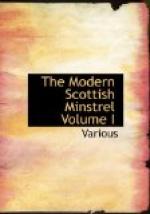Though living in constant retirement at Linshart, the reputation of the Longside pastor, both as a poet and a man of classical taste, became widely extended, and persons distinguished in the world of letters sought his correspondence and friendship. With Dr Gleig, afterwards titular Bishop of Brechin, Dr Doig of Stirling, and John Ramsay of Ochtertyre, he maintained an epistolary intercourse for several years. Dr Gleig, who edited the Encyclopaedia Britannica, consulted Mr Skinner respecting various important articles contributed to that valuable publication. His correspondence with Doig and Ramsay was chiefly on their favourite topic of philology. These two learned friends visited Mr Skinner in the summer of 1795, and entertained him for a week at Peterhead. This brief period of intellectual intercourse was regarded by the poet as the most entirely pleasurable of his existence; and the impression of it on the vivid imagination of Mr Ramsay is recorded in a Latin eulogy on his northern correspondent, which he subsequently transmitted to him. A poetical epistle addressed by Mr Skinner to Robert Burns, in commendation of his talents, was characterized by the Ayrshire Bard as “the best poetical compliment he had ever received.” It led to a regular correspondence, which was carried on with much satisfaction to both parties. The letters, which chiefly relate to the preparation of Johnson’s Musical Museum, then in the course of publication, have been included in his published correspondence. Burns never saw Mr Skinner; he had not informed himself as to his locality during the prosecution of his northern tour, and had thus the mortification of ascertaining that he had been in his neighbourhood, without having formed his personal acquaintance. To Mr Skinner’s son, whom he accidentally met in Aberdeen on his return, he expressed a deep regret for the blunder, as “he would have gone twenty miles out of his way to visit the author of ‘Tullochgorum.’”




